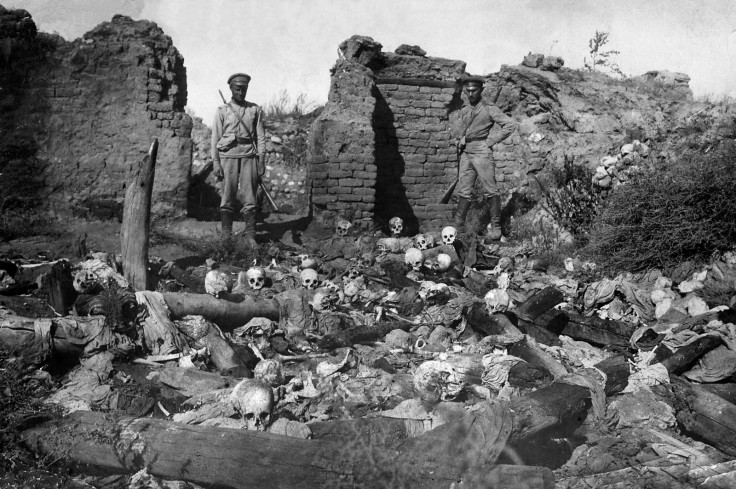We must stop denying the Armenian Genocide by Turkey
Armenian people across the world have been commemorating the Armenian Genocide on 24 April every year.

According to Prime Minster David Cameron, a national service of commemoration at the Cenotaph in London on Anzac Day, 25 April, 2015, will be a high-profile UK-Led event arranged in co-operation with the governments of Australia and New Zealand, who have held a ceremony there on that date for the last 98 years.
Unsurprisingly, the prime minister's announcement also includes a UK-led Commonwealth and Ireland ceremony at the Commonwealth War Graves Commission Helles Memorial in Turkey on 24 April, 2015, the eve of the Gallipoli landings. The Prince of Wales will be leading the UK delegation.
But the year 2015 also marks the Centennial of the Armenian Genocide, the first genocide of the 20<sup>th century, organised and perpetrated throughout different regions of the Ottoman Empire by the government of the Young Turks in 1915 during the course of World War I.
Armenian people across the world have been commemorating the Armenian Genocide on 24 April every year.
The British Armenian Community has petitioned Downing Street every year calling for official recognition of the veracity of the Armenian Genocide by the government in the UK, urging our successive prime ministers to stop the denial of the first genocide of 20<sup>th Century and complying with Turkey's policy of unjust denial.
In a blatant act of denial, Turkey's president Recep Tayyip Edogan invited Armenian President Serzh Sargsyan to ceremonies marking the Centenary of the Battle of Gallipoli in Çanakkale on 24 April 2015, which coincides with the Armenian Genocide Remembrance Day.
This is the first time that the Battle of Gallipoli will be commemorated on 24 April.
President Sargsyan rebuffed Erdogan's invitation by reminding Erdogan of the invitation handed to him in person several months ago for the events to be held in Yerevan, Armenia on 24 April, 2015 to mark the Centenary of the mass killing of Armenians across Ottoman Empire, to which the Turkish president has not ever responded.
Genocide scholars agree that 70% of the Armenian population, roughly 1.5 million, were killed mercilessly or fell victim to starvation and illness during the forced deportations. Massacres and deportations continued throughout 1916 and occurred with lesser intensity until 1923.
In an open letter addressed to Turkey's Prime Minster in 2005, the International Association of Genocide Scholars invited Turkey to face its history and officially recognise the Armenian Genocide. Since 1965 over 20 countries and international bodies, including Germany, Canada, France and Italy have recognised the veracity of the Armenian Genocide.
Turkey and its allies remain adamant by denying the historical validity of the Armenian Genocide. The UK, USA and Israel's governments fail to realise that by supporting Turkey's policy of denial, they promote injustice.
In the case of the British government, they deny their own history by forgetting the fact that in the course of World War One the British government revealed the truth about the genocidal fate of the Armenians.
So why, 100 years on, does today's British government refuse to acknowledge that truth?
The first phase of the massacres and forced deportations of Armenians began with the arrest, confinement and murder of 1,000 Armenian community leaders, doctors, lawyers, merchants, pharmacists and teachers in Constantinople, modern-day Istanbul, capital of Ottoman Turkey, on 24 April 1915.
This date is therefore significant and commemorative for Armenians across the globe.
Given the recent changes in Turkey and following the assassination of the Turkish Armenian journalist Hrant Dink, the Armenian Genocide is commemorated in Turkey every year. Turkish intellectuals openly address the subject, inviting their government to change their policy of denial.
The Turkish government should realise that after 100 years of denial, it is time to acknowledge their past and accept that millions of Armenians and other Christians fell victim to their 'relocation' policy of Christian minorities.
By acknowledging the truth, they will pave the way for Turkey's democratisation and progress bringing the country closer to European values.
Raffi Sarkissian is a co-chair of the Armenian Genocide Centenary Commemoration Committee.
© Copyright IBTimes 2025. All rights reserved.





















